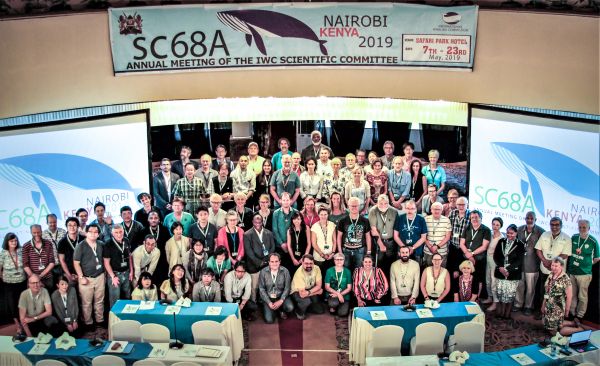Annual Scientific Committee begins in Nairobi
The annual meeting of the IWC Scientific Committee begins today in Nairobi, Kenya.
Around 150 of the world’s leading cetacean scientists will gather to review the latest research on a wide range of topics related to cetacean science, conservation and management.
Following an opening, two-day plenary session, seventeen sub-committees will form and run concurrently. The discussions and recommendations of each group will be assessed at a second, concluding plenary session which will run over the final three days. The report of the meeting, which summarises discussions and records the recommendations and workplan of the Committee, will be made available shortly after the close of the meeting.
The focus of sub-groups ranges widely, from modelling long-term population changes to understanding human impacts such as whale watching or ocean noise, and processes such as data management, photo-identification and DNA techniques.
An important item on this year’s agenda is the Database of Recommendations. This new software will enable the Commission to collate, prioritise and track recommendations made across all its committees and groups, including the seventeen groups that make up this year’s Scientific Committee who will be first to use the new system.
The meeting also sees the creation of a new group called Implementation Reviews and Simulation Trials (IST). This amalgamates two previously separate groups working on whaling management procedures. The amalgamation reflects the fact that the work to develop catch limit calculations for Aboriginal Subsistence Whaling was largely and successfully completed in 2018, and the remaining work of this group can be combined with work under the Revised Management Procedure. The main focus of the new IST group is the Implementation Review process which is used to provide advice on safe catch limits for a particular species in a particular area. These Reviews are required for Aboriginal Subsistence Whaling hunts and would also be required if the Commission were to lift the moratorium on commercial whaling.
Perhaps the most important aspect of the 2019 Scientific Committee meeting is the effort to increase engagement and accessibility for scientists and organisations in Africa and beyond, who may not have previously attended IWC meetings. In recent years, the Commission has focused on ways to increase participation for countries of limited means. In 2016 a voluntary fund was established to provide financial assistance to eligible delegates otherwise unable to attend IWC events.
A paper was also endorsed at the 2018 meeting which set out the different ways that countries could increase engagement with the Commission. These range from hosting a large meeting as Kenya has generously undertaken this year, to participating in meetings, workshops and intersessional groups, both in person and remotely, or by submitting data or reports via various IWC processes, for example National Progress and Voluntary Conservation Reports. The IWC has also established a mentoring process for new delegates and is increasing efforts to overcome language barriers.
Increased engagement brings extensive and mutual benefits, with world-leading scientists and long- standing members of the Scientific Committee able to share their research and experience, and new participants bringing information on little-studied regions and cetacean populations.
The meeting runs from 10–22 May and the report will be available on the IWC website in June.
To read reports from previous Scientific Committee meetings, click here.

